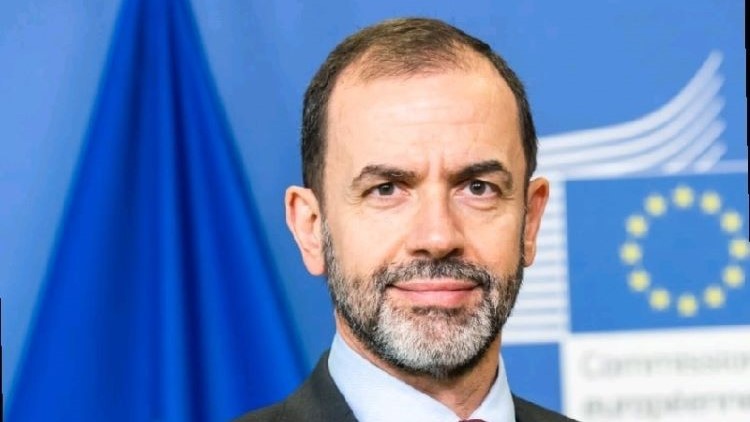Eduardo González
The Minister of Foreign Affairs, José Manuel Albares, assured yesterday that the Spanish Government is waiting for what the International Court of Justice (ICJ) decides to rule on the lawsuit filed by South Africa against Israel for genocide. When that happens, he warned, “Spain is going to speak, and it will speak clearly.”
“We respect South Africa’s demand, obviously,” Albares declared during an informative breakfast organized in Madrid by New Economy Forum. “Spain supports the work of the international courts, the International Court of Justice, where the lawsuit is being substantiated, and the International Criminal Court,” he continued.
“We want to be respectful of the work of the ICJ, which is examining whether it is competent for South Africa’s claim, whether there are indications that substantiate the claim and whether precautionary measures must be taken,” the minister said. “Until then,” he added, “the opinion of any State, for or against”, should not interfere. “We will wait for him to speak out,” and, when that happens, “no one should worry, Spain will speak, and it will speak clearly,” he said.
Sumar, the party led by the second vice president of the Government, Yolanda Díaz, has requested that the International Court of Justice, the main judicial body of the UN, order the precautionary measures requested by South Africa in its genocide lawsuit against Israel, including the adoption of a ceasefire in the Gaza Strip. Pedro Sánchez’s Executive has not formally ruled on this complaint, which was defended on January 11 in the Court of The Hague by South Africa. Díaz received the South African ambassador, Sankie Mthembi-Mahanyele, this past Tuesday to convey her support for the initiative of her country.
Red Sea
On the other hand, Albares also addressed yesterday the Spanish Government’s refusal to participate in the US-led mission against the Yemeni Houthis in the Red Sea. “Spain makes decisions in a sovereign manner and I believe that Spain’s commitment to global peace and security is beyond any doubt,” but “Spain does not have to participate in all the missions and all the coalitions that exist,” he warned.
“On Monday in Brussels, at the Foreign Affairs Council, I, together with my European colleagues, are going to debate a purely European mission that will be present in the Red Sea, if we all decide unanimously, and, of course, Spain will not “He is going to oppose the emergence of a European operation,” he added.
In this regard, the high representative of the European Union for Foreign Affairs and Security Policy and vice president of the European Commission, Josep Borrell, assured yesterday in Valladolid – where he was awarded an Honoris Causa Doctorate by the University of this Castilian city – that the EU does not will send its ships to participate in active combat missions to the Red Sea, but only to protect shipping in “a vital artery.” “We are preparing a naval mission with the sole objective of protecting navigation and not escalating the conflict,” he added.
Spain has refused to send ships and troops to Operation Prosperity Guardian, led by the US to protect shipping in the Red Sea against attacks by Houthi rebels. The Government of Pedro Sánchez has requested the creation of a specific mission with “its own scope, means and objectives” and has rejected the European Union’s claim to link this operation to Atalanta, the mission led by Spain to combat piracy in the ocean. Indian. Last Monday, Sánchez himself specified that he is willing to “study” the US proposal for Spain to participate with liaison officers in the Red Sea mission and reiterated that his Government is not opposed to the creation of any operation in the Sea. Red as long as he is not part of Atalanta.
Middle East, USA and Argentina
In any case, Albares assured that Spain’s position on the mission in the Red Sea does not have to cloud relations with the United States. “I have a magnificent conversation with Tony Blinken,” the North American Secretary of State. “What Spain wants is peace and stability in the Middle East, Spain has clearly condemned the terrorist attack by Hamas, and has said that Israel has the right like any State to defend itself from a terrorist attack, but if anyone expects Spain to lower its voice in defense of the innocent Palestinian civilians who are dying in Gaza, and in asking that, once and for all, this is the last time we see this explosion of violence in the Middle East, Spain is not going to do it,” he warned.
“We all know what we need for this to be the last time we see this explosion of violence, and that is called a realistic and viable Palestinian State, a State in which the same Palestinian authority has Gaza and the West Bank under its authority, connected by a corridor with an exit to the sea in a port in Gaza and with its capital in East Jerusalem,” he added. The Palestinians, he warned, “must not be condemned to being a people of refugees.” “The maps are drawn, they have been agreed upon, but the political will, the political courage is lacking” to materialize it, he lamented.
Regarding the possible victory of Donald Trump in the next US elections, Albares preferred not to comment on “processes of internal democracy in the United States”, but he did mention that the Government maintains a “close relationship” with the Administration of Joe Biden and his “shared agenda in defense of multilateralism, equality and diversity”, an agenda that “we would not like to see changed by the United States.” “That is the United States that we feel comfortable with and that we would like to continue seeing,” he concluded.
Albares also assured that he still does not know of “any request or any scheduled date” for a possible visit to Spain by the new president of Argentina, Javier Milei, but he was able to “chat for a few minutes” with his new Argentine counterpart, Diana Mondino, in the margins of the recent Davos Forum meeting. In any case, he assured that Spain wishes “success to Argentina and the Argentine people in this new stage” and guaranteed, both to companies and to Spaniards living in that country (“Argentina is the largest Spanish colony outside of Spain”), that “they will always find the Government of Spain at their side.”
The event was presented by the former president of the Government José Luis Rodríguez Zapatero, who stated that foreign policy is “the highest stage of politics” of a country and praised Albares’ work in a world that is experiencing the “worst moment since the Second World War”, with “33 active war conflicts, half as serious.”






